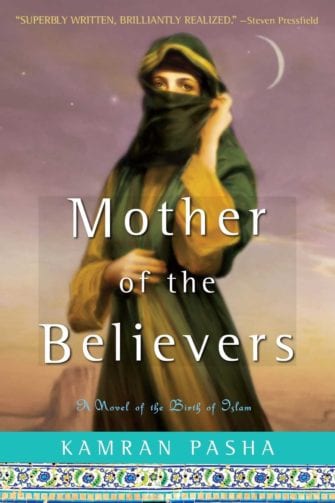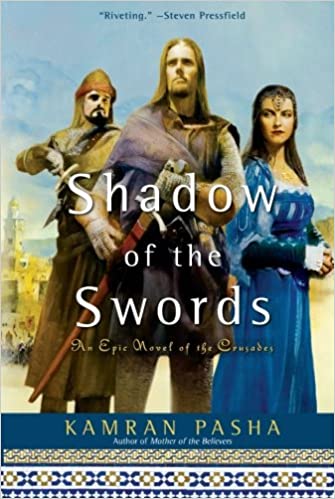Recently, The Hollywood Reporter published an op-ed about how Hollywood could better represent Muslim characters, something I am passionate about, having spoken about it at length on Ladies First and That’s Haram!, both part of the The Fandomentals Podcast Network.
In great timing, I had the opportunity to correspond with Pakistani writer Kamran Pasha about his experiences in the industry and his incredibly varied career spanning nearly twenty years which provides a much needed perspective to the issue of writing Muslim characters who are not one-dimensional.
Born in Pakistan and raised in Brooklyn, Pasha’s journey into Hollywood is as interesting as the media that he’s written.
For example, when asked how he got to Hollywood, Pasha explained that he’d been writing since childhood. His first published story was a murder mystery modeled on Agatha Christie (his favorite author) in fifth grade but he had never believed he could have made a professional job out of writing. After writing as a journalist for three years, Pasha went to graduate school and obtained a law degree and an MBA.
“I was bored and unfulfilled. I had written a teen horror screenplay in business school just as a creative exercise. I had no contacts but I sent it out to agents in Hollywood unsolicited. Most never read it. One did. He liked my work and represented me. Shortly thereafter I wrote and sold a couple of scripts to Paramount and was shocked that I was being paid by big Hollywood studios for my work.”
Pasha ended up quitting his job as a lawyer and moved to LA in 2001 to see if he could make a career out of screenwriting and did so, leading to his storied career thus far. He’s been on multiple TV series, a film, and wrote for the 50 Cent video game. An incredibly versatile writer, Pasha has also published two novels with Simon & Schuster. The first, Mother of the Believers follows Aisha, wife of Prophet Muhammad (PBUH), and Shadow of the Swords about Saladin and the Third Crusade.
One of the most interesting series on Pasha’s resume is Emmy-nominated Sleeper Cell. Produced by Showtime, it aired in 2005 to 2006 and followed a Muslim FBI agent fighting terrorists. For an industry that for so long has only shown Muslims as the terrorists, Sleeper Cell was a completely different approach and of course I asked Pasha about his experience writing and producing the series.
“It was great to work on the show as a writer, and I had the opportunity to write scripts which showed how Islam is a peaceful and beautiful faith, not the violent and ugly religion that a few extremists have tried to make it.”
The series was also one of the first to show a gay Muslim, even if in this case it was a man conflicted about his sexual orientation who then “funneled his self-hatred into joining an extremist group.” Pasha continues on to say that “it was a chance to explore issues about gay identity in the modern Muslim community, and how the terrorists are often motivated by deeply personal scars that they translate into violent extremism. I am very proud of the show and the work I contributed to it.”
In fact, Pasha has enjoyed most of the shows he’s worked on but Sleeper Cell was the one that allowed his “unique voice and talents” to truly shine!
Having an inclusive writers room where the writers are allowed to thrive and write from their experiences leads to more complex characters across the board, and NBC produced Kings is another example of this.
The show, which told the story of King David in a world resembling the United States, presented a tale found in multiple faiths. David is a figure in Christianity, Judaism, and Islam so having writers of those religious backgrounds impacted the writing of Kings characters.
“We definitely wanted to honor the character of David, who is central to Judaism, Christianity and Islam. We had Jewish writers as well as devout Christian, and myself as the Muslim in the room.”
Importantly, Daud as named in the Qu’ran is not a flawed character like in the biblical account where David commits adultery. Pasha explains that in Islam, Daud is “a holy prophet and someone of unimpeachable moral character.” Thus, when the writers explored adapting his story in a more modern manner, he made sure to question if he felt that the writers “were adjusting his character in ways that were too dark.” This allowed the final show to be a “balanced and healthy portrayal of his character.”
However, even when writers are allowed to provide their opinions, the showrunners always have the last say. Take Reverend Samuels for example.
Portrayed by Eamonn Walker, he was one of the only characters of color on the show and his death at the end of the show was problematic. As we know from reports from WGAW, writers don’t have the final say on scripts which Pasha echoes.
“We did our best to add a minority perspective, but ultimately we weren’t the final call on the scripts. Some critics have said in the years since the show was made that there were old tropes in Kings, including “the magical black man” idea that has been in Hollywood for a century.”
Pasha does believe that the industry is “evolving slowly and steadily and it is a process for writers to become aware that such tropes exist and can be offensive to some viewers.” Writers then must do their “best to listen to audience feedback and keep moving forward, hopefully with more awareness.”
For the David/Jack fans out there, had the show received a second season, we might have seen a love triangle after all. Well, a possibility of a “love triangle between David, Jack and Michelle. We talked about having Jack fall in love with David, but that his feelings would be unrequited. Since the show never made it to a second season, we’ll never know what could have been.”
Interestingly, Pasha’s favorite genre is actually historical dramas and having written for The CW’s Reign about Mary Queen of Scots, he’d like to work on a fun fantasy drama like Game of Thrones next. When asked who he’d love to work with next, he answers with that “Peter Jackson manages to tell stories that are epic and still deeply personal” which Pasha aspires to in his own work. It makes complete sense that he’s enjoying The Witcher on Netflix.
Even better, then, that he’s working on several period dramas of his own “including TV shows set in the Ottoman Empire and Moorish Spain.” He’s also working on his “third book which is a telling of the Biblical story of Esther, about a Jewish girl who becomes the Queen of Persia and saves her people from a genocidal pogrom.”
Still, Pasha acknowledges that being a Muslim in Hollywood is hard after having worked in so many genres and mediums.
“Most people in the industry, including those who pride themselves on being progressive, have a lot of misconceptions about Islam and a lot of subconscious hostility toward Muslims. I try on any show I work on to come across as a friendly and positive person which helps heal some of the misunderstandings.”
Quite frankly, for all the talk from Hollywood about diversity and inclusion, in the year 2020 it’s more clear than ever how much of that is just talk. Pasha concurs.
“I think that many Muslims today are under a false impression that Hollywood is a place that is looking for diverse voices and will welcome them with open arms. For all of Hollywood’s PR talk about diversity, it is still very white and very “fake liberal. Muslims face the double whammy of being a minority in the film industry and also being associated with Islam, which is seen by many Hollywood types as a threatening religion. So Muslims have to work harder just to break through, and the battle only gets tougher as you start rising and people who don’t like your religion become worried that you could actually achieve power in the industry.”
When asked for advice to Muslim writers trying to break into the industry, Pasha talks about tawakkul, the Islamic concept for having trust in Allah, and trusting Allah’s plan.
“Being a writer, filmmaker or any kind of professional artist is a very challenging career. Even if you are brilliant at your craft, success is often slow, and much of the journey is failure and financial difficulty. If you choose the life of an artist, you have to focus on improving your craft and leave the rest to God.”
Working in Hollywood can be a very painful and lonely journey for Muslims, making it “critical for us to increase our faith in God. If we have God helping us, that’s all we need at the end of the day.”
Clearly tawakkul has eased some of the frustrations that come from working in Hollywood and especially as this year has pushed for even more representation on-screen and behind the scenes.
I for one am excited to see what Pasha works on next!
This interview has been edited and condensed for clarity.
Images courtesy of Simon & Schuster, Kamran Pasha, NBC, Showtime, and The CW.



